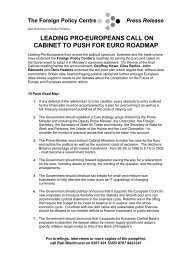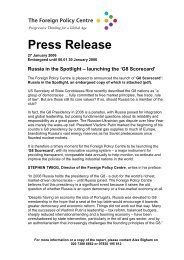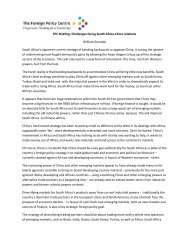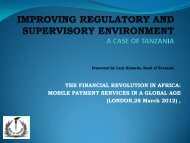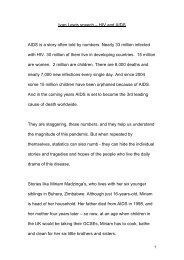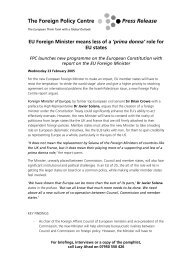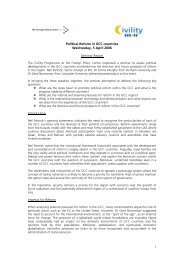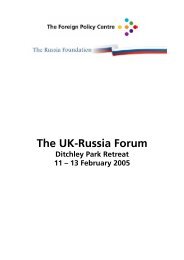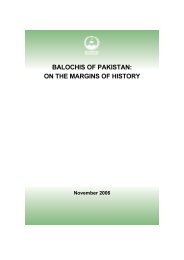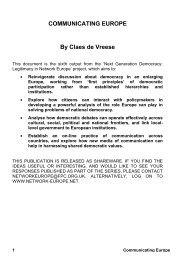The Political Fortunes of War - Foreign Policy Centre
The Political Fortunes of War - Foreign Policy Centre
The Political Fortunes of War - Foreign Policy Centre
Create successful ePaper yourself
Turn your PDF publications into a flip-book with our unique Google optimized e-Paper software.
<strong>The</strong> <strong>Political</strong> <strong>Fortunes</strong> <strong>of</strong> <strong>War</strong><br />
Table 4: Impact <strong>of</strong> Casualties, Disposable Income, and Major Events<br />
on Presidential Job Approval During Iraq <strong>War</strong> and Occupation<br />
(March 19, 2003 to April 30, 2004)<br />
Significant Impact<br />
19<br />
Change in<br />
Approval (%)<br />
Casualties (100s) -1.2<br />
Iraq war begins (March 19, 2003) 9.4<br />
Fall <strong>of</strong> Baghdad (April 9, 2003) 6.1<br />
No significant impact<br />
Percent change (yearly) in disposal income/capita<br />
Bush “mission accomplished” speech (5/1/2003)<br />
UN approves occupation <strong>of</strong> Iraq (5/22/2003)<br />
Iraq governing council meets for first time (July 13, 2003)<br />
UN headquarters bombed (8/19/2003)<br />
Bomb kills 14 Italian personnel (11/12/2003)<br />
Saddam Hussein captured (12/13/2003)<br />
Iraqi prisoner abuse revealed (4/28/2004)<br />
<strong>The</strong> <strong>Political</strong> <strong>Fortunes</strong> <strong>of</strong> <strong>War</strong><br />
Also available from <strong>The</strong> <strong>Foreign</strong> <strong>Policy</strong> <strong>Centre</strong><br />
Individual publications can be ordered from<br />
Central Books, 99 Wallis Road, London, E9 5LN<br />
Tel: 020 8986 5844, fax: 020 8533 5821<br />
Email: mo@centralbooks.com<br />
To read online go to www.fpc.org.uk/publications<br />
THE BEIJING CONSENSUS<br />
Joshua Cooper Ramo<br />
Spring 2004 £9.95, plus £1 p+p.<br />
<strong>The</strong> former <strong>Foreign</strong> Editor <strong>of</strong> Time magazine, Joshua Ramo, argues that<br />
there is a new ‘Beijing Consensus’ emerging with distinct attitudes to<br />
politics, development and the global balance <strong>of</strong> power. It is driven, the<br />
author argues, by a ruthless willingness to innovate, a strong belief in<br />
sovereignty and multilateralism, and a desire to accumulate the tools <strong>of</strong><br />
'asymmetric power projection'. Though it is <strong>of</strong>ten misunderstood as a<br />
nascent superpower, China has no intention <strong>of</strong> entering an arms race.<br />
Instead, it is intent on projecting enough 'asymmetric power' to limit US<br />
political and military action in its region. Through fostering good<br />
international relations, it is safeguarding the peaceful environment needed<br />
to secure its prosperity, and deterring the attempts <strong>of</strong> some on the fringes <strong>of</strong><br />
US politics to turn it into a pariah. Ramo argues that China <strong>of</strong>fers hope to<br />
developing countries after the collapse <strong>of</strong> the Washington consensus. It<br />
provides a more equitable paradigm <strong>of</strong> development that countries from<br />
Malaysia to Korea are following. Based on more than a hundred <strong>of</strong>f the<br />
record discussions, the Beijing Consensus captures the excitement <strong>of</strong> a<br />
country where change, newness and innovation are rebounding around<br />
journal articles, dinner conversations and policy-debates with mantra-like<br />
regularity.<br />
20



